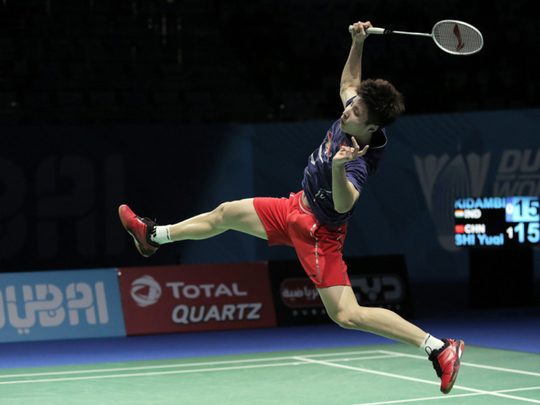
Dubai: The sun is slowly setting on China.
Once considered the bastion of badminton, the axis of dominance of the Chinese in the sport has shown a definite shift, with other nationssuch as Denmark, Hong Kong, Taipei, India and South Korea hogging much of the limelight.
For the first time this year, Chinese players failed to win a single Superseries singles title, and last week’s BWF Dubai World Superseries Finals proved more than this – China was surely losing its foothold on the badminton stage.
Of the five categories contested, China managed just one title – Zheng Siwei and Chen Qingchen combining to beat Hong Kong’s Tang Chun Man and Tse Ying Suet for the Mixed Doubles crown at the Hamdan Sports Complex last Sunday.
The remaining four evened out among other badminton playing nations.
Viktor Axelsen of Denmark successfully defended his men’s singles title at the cost of Malaysian legend Lee Chong Wei, while China’s consolation came through a third place from Shi Yuqi. In the women’s final, India’s PV Sindhu once again ended up as the bridesmaid – and not the bride – going down in three games against 20-year-old Japanese girl Akane Yamaguchi, while Chen Yufei landed the bronze for China.
This was the third straight year that the men’s singles had a non-Chinese player as champion.
The superpower came close to the men’s doubles title with Liu Chen and Zhang Nan battling Marcus Fernaldi Gideon and Kevin Sanjaya Sukamuljo in the final. But it was the pair from Indonesia coming clean and denying the Chinese. The women’s doubles was an all-Japanese affair with Shiho Tanaka and Koharu Yonemoto getting the better of Yuki Fukushima and Sayaka Hirota leaving the Chinese pair of Huang Yaqiong and Yu Xiaohan for fourth position.
Going down memory lane, not so long ago China was the sole superpower in the sport. Take the women’s game for instance. In 2010, despite the presence of players like India’s Saina Nehwal, Denmark’s Tine Baun, Germany’s Juliane Schenk and South Korea’s Sung Ji Hyun, China managed to win eight Superseries, excluding the season-ending World Superseries Finals.
A year later China hit peak form while winning an amazing eleven Superseries of the total 12, with the lone exception of losing out at the India Open where Thailand’s Porntip Buranaprasertsuk triumphed. They continued holding sway while winning another seven Superseries in 2012 and 2013.
Players like Nehwal were joined by a new breed of stars such as Thailand’s Ratchanok Intanon, Chinese Taipei’s Tai Tzu Ying, Japan’s Akane Yamaguchi and Spain’s Carolina Marin. But China still dominated 2014 winning nine Superseries that season.
And then the slump came along.
By 2015 entered a new breed of players with names like Nozomi Okuhara and Minatsu Mitani (both Japan), Beiwen Zhang (Malaysia), Cheung Ngan Mi (Hong Kong) joined by a strong Korean contingent that included the likes of Bae Yeon Ju, Sung Ji Hyun and Kim Hyo Min.
No doubt, China has been the big player in badminton besides other sport like table tennis, swimming and gymnastics. But while China has managed to perform consistently at a high level, other nations have upped the ante and challenged themselves to beating the Chinese while shredding down their dominance.
In the ten years since the establishment of the season-ending BWF Superseries Finals, China has gone on to claim an incredible 17 titles from the 50 played out. The only category the Chinese have been unable toto deliver is the men’s doubels where they are yet to win a crown. And yet, this success rate amounts to an astonishing 34 per cent while leaving the remaining two-thirds of the titles for other countries.
Players from Denmark have made an impact among the Europeans claiming a total of ten titles, but they are yet to win in the women’s singles. Malaysia too have done well winning a total of nine, of which four have come in the men’s singles alone through the legendary Lee Chong Wei. Japan have taken their tally to five following Yamaguchi’s latest triumph against Sindhu in the women’s singles.
However, the recent absence of the Chinese should not be taken for granted. “They have a pedigree to perform at every stage. Every country goes through a lull and the past couple of years have shown that China has not been good enough with its best badminton players. We would be making the biggest mistake if we think this will continue,” Seu Bock Tey, Malaysian coach who trains Lee Chong Wei told Gulf News.
“China is China and they will be back at their best very soon. It may not be next year or in 2019. But they will be ready to mount a challenge with some more new faces coming through,” he cautioned.
Superseries Finals performances by nations (from 2008 to 2017)
No. Nation MS WS MD WD XD Total
1. China 3 4 0 5 5 17
2. Denmark 2 0 3 1 4 10
3. Malaysia 4 1 2 2 0 9
4. Japan 1 2 0 2 0 5
5. Indonesia 0 0 3 0 0 3
6. South Korea 0 0 2 0 0 2
6. Taipei 0 2 0 0 0 2
7. Hong Kong 0 1 0 0 0 1
7. England 0 0 0 0 1 1
-Ends











